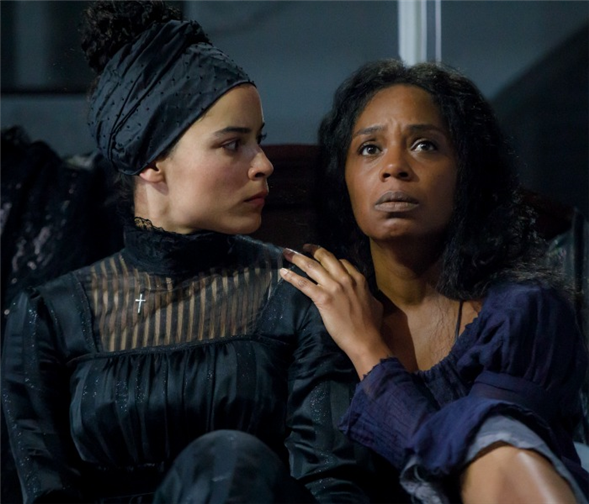Translate Page

How Marcus Gardley reinvented Federico García Lorca's The House of Bernarda Alba
---
Back in 2010, The New Yorker's Hilton Als described playwright Marcus Gardley as "an interesting heir to García Lorca, Pirandello and Tennessee Williams." While any emerging dramatist would appreciate being likened to such theatrical giants, Gardley found the comparison to Federico García Lorca, one of Spain's most revered writers, particularly meaningful. "He's one of my favorite playwrights," Gardley says. "I'm inspired by his poetic voice."
When Als made that pronouncement, he wasn't aware that Gardley was already at work on The House That Will Not Stand, a reimagining of The House of Bernarda Alba, the last play García Lorca completed (he was killed before it was ever performed). Both the source material and Gardley's reinvention, currently running at New York Theatre Workshop, focus on a well-to-do household in which a mother and her adult daughters battle each other as well as societal conventions. Gardley's play moves the action to 19th-century New Orleans in a mixed-race Creole community -- that's 100 years prior to Bernarda Alba and thousands of miles from Spain. Yet both works explore the oppression of women and how they participate in the subjugation of their own sisters and daughters.
Gardley frequently uses American history for dramatic fodder. His 2015 play An Issue of Blood was set on a 17th-century Virginia plantation, and last year's X: Or, Betty Shabazz v. The Nation examined the life and death of Malcolm X. The title of his latest work is an oblique reference to Abraham Lincoln's 1858 House Divided speech: "A house divided against itself cannot stand." Yet Gardley's family history is what motivated him to tackle this project. "The women on my mother's side, who raised me, all come from New Orleans," he says. "The core of the story really had to be about these women and their struggle to survive."
{Image1}
Indeed, Gardley's play is totally about the women. As in García Lorca's original, all the characters in The House That Will Not Stand are female, though here they're black. Only one man appears on stage, but he's a corpse. Almost all professional productions of the show, which had its world premiere in 2014, have been directed by women of color; Lileana Blain-Cruz helms the current staging. That's as it should be, says Gardley. "There's only so much I can bring to it because I am a man."
One thing the playwright definitely brings to the play is an unexpectedly humorous tone considering its serious themes. However, Gardley insists he got that from the original. While watching a mounting of Bernarda Alba, he recalls, "I laughed through the entire thing. I think I was the only person laughing!" Those around him were confused, convinced they were watching a drama, but Gardley says, "It's a comedy until the end -- then it's a tragedy."
Thus The House That Will Not Stand is full of laugh-out-loud moments, but Gardley hopes it will elicit all kinds of noises. "I come from the black church, where everybody's vocal all the time," he says. He believes theatre should be no different. After a recent performance full of audible feedback, "the actors called me and said it was the best experience they ever had because it felt like the audience was on stage with them," he says. "I really wanted to create something where people could go and laugh in one breath, and in the next experience a deeply emotional moment."
For those interested in checking out a production of García Lorca's original play, Repertorio Español will be performing it in Spanish with English subtitles this fall.
To read about a student's experience at The House That Will Not Stand, check out this post on TDF's sister site SEEN.
---
Regina Robbins is a writer, director, native New Yorker and Jeopardy! champion. She has worked with several NYC-based theatre companies and is currently a Core Company Member with Everyday Inferno Theatre.
Top image: Juliana Canfield and Michelle Wilson in The House That Will Not Stand. Photos by Joan Marcus.
TDF Members: Go here to browse our latest discounts for dance, theatre and concerts.